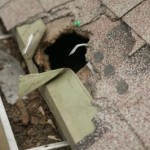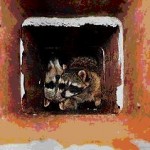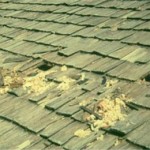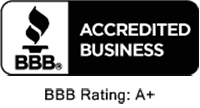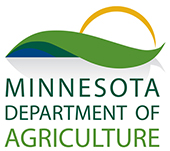MN Wild Animal Management | Raccoon Removal
RACCOON: (Procyon lotor) This common nuisance species is very intelligent, curious, and physically capable – strong, and a good climber. Raccoons frequently break into houses and attics, both in search of food and shelter. They’ll also steal pet food, poop in your pool, and get into all sorts of mischief. The raccoon’s antics and its appealing face make it look adorable. But make no mistake… Raccoons are a nuisance and a danger.
These animals can knock over garbage cans, tear up your lawn, nest in your chimney, attics, or under your deck, and also ruin gardens. They will even rip up the duct work, tear the insulation off of pipes, rip up wires, trample or pull up the insulation, rip off any paper lining, and sometimes even damage wood joists. Believe me, they are a force to reckon with.
The bigger problem may be the bio-hazardous contamination they cause. They urinate and defecate in the attic, and the droppings can contain raccoon roundworm – transferable to humans, or diseases such as canine distemper, transferable to your pets. They also may bring in the fleas and other parasites associated with wild animals. It’s just the way they are.
Adults range from 10 lbs on up, with some reaching over 40lbs. They can live up to 12 years in the wild, though average life spans average closer to 5-6 years. Raccoons mate in the winter, around December, and the females give birth to an average of 3-5 young. Raccoons are omnivores, which means that they eat both meat and plant matter, and they have a varied diet. They live in a variety of habitats, but the highest populations are actually in developed suburban or urban areas.
Raccoons are among the most common animals wildlife control specialists are called on for removal. The damage done by these mammals is often done in spring when females are searching for the best place to nest. They are a common carrier of rabies, a potentially fatal disease. They also carry canine distemper, which can kill your dog. Their feces may contain raccoon roundworm, the spores of which humans can breathe in and become seriously infected by, so it is important to capture raccoons.
Don’t try to mess with them. The best prevention advice is to stay away from wild animals, live or dead. Even the Minnesota Wild Animal Management Agency warns of how much of a nuisance (and a danger) Raccoons can be.
Be aware that there’s seldom just one raccoon. There’s usually a nest of baby raccoons in the attic – like at least 85% of the time. The baby raccoons must be found and removed! If not, they will cry and cry and starve to death without the mom, then die and rot and stink and attract a lot of flies and maggot fly hatches.
If you are hearing mouse-like squeals from above your fireplace damper, chances are they’re coming from baby raccoons. March through June is usually baby time.
Make sure your wildlife professional goes in the attic and finds and removes the baby raccoons.

